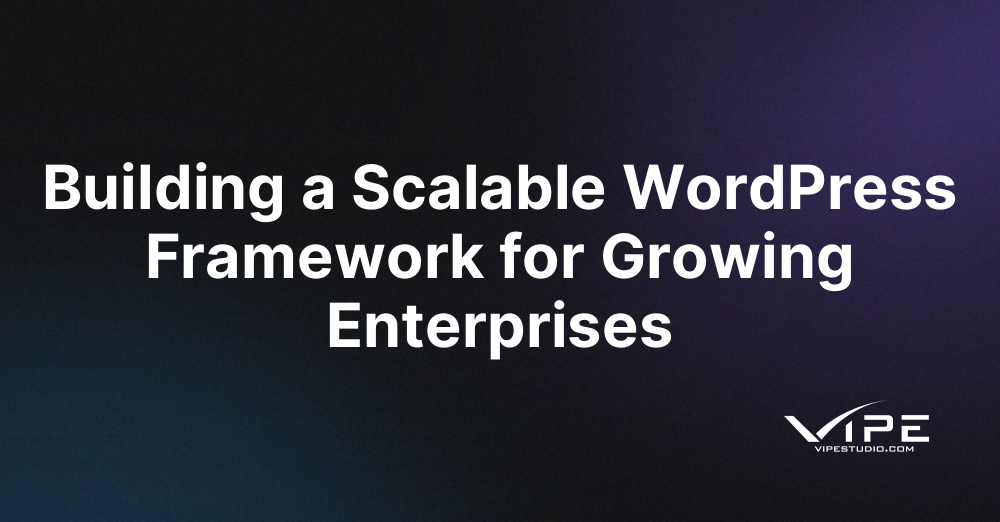19.11.2024
WordPress Development
Building a Scalable WordPress Framework for Growing Enterprises
READING TIME: MIN
Table of Content
Building a Scalable WordPress Framework for Growing Enterprises
As enterprises expand, their digital presence must evolve to meet increasing demands. A scalable WordPress framework provides the flexibility and performance necessary to support growth, enabling businesses to manage more content, users, and traffic without compromising on speed or functionality. Here are five essential strategies for building a scalable WordPress framework tailored to the needs of growing enterprises.
Choose the Right Hosting Solution
The backbone of any scalable WordPress framework is a robust hosting solution. For growing enterprises, opting for a managed WordPress hosting provider is crucial. Key features to look for include:
Scalability: Choose a hosting plan that allows for easy upgrades as your traffic and data storage needs grow.
Performance Optimization: Select hosts that utilize SSD storage, caching, and Content Delivery Networks (CDNs) to enhance load speeds and performance.
Enhanced Security: Ensure that the hosting provider offers security features such as firewalls, DDoS protection, and regular backups to safeguard your data.
Investing in a high-quality hosting solution sets a strong foundation for your enterprise's online presence and prepares it for future growth.
Utilize a Modular Theme Architecture
A well-designed theme is essential for creating a scalable WordPress framework. Adopting a modular theme architecture allows for flexibility and ease of updates. Consider the following aspects:
Child Themes: Use child themes to enable customization without affecting the main theme, ensuring updates to the parent theme do not disrupt your site’s functionality.
Responsive Design: Implement a responsive design that adapts to various screen sizes and devices, ensuring a seamless user experience across platforms.
Modularity: Structure your theme with reusable components and templates, making it easier to add or modify features as needed without extensive coding.
By utilizing a modular theme architecture, enterprises can ensure their WordPress sites remain adaptable to changing requirements.
Implement a Reliable Content Delivery Network (CDN)
As your enterprise grows, so does the volume of content served to users. A Content Delivery Network (CDN) can significantly enhance site performance and scalability. Benefits of implementing a CDN include:
Faster Load Times: CDNs distribute content across multiple servers worldwide, reducing latency and improving load times for users, regardless of their location.
Increased Reliability: CDNs provide redundancy; if one server goes down, another can serve the content, ensuring your website remains accessible.
Scalability During Traffic Spikes: CDNs can handle sudden traffic surges more effectively, preventing server overload and downtime during peak periods.
Incorporating a CDN into your WordPress framework enhances performance and user experience, critical components for growing enterprises.
Optimize Database Performance
As an enterprise grows, the volume of data stored in the WordPress database also increases. Optimizing database performance is vital to ensure quick access to information. Strategies to consider include:
Regular Cleanups: Use plugins like WP-Optimize to clean up unnecessary data such as post revisions, spam comments, and transient options, reducing database bloat.
Database Indexing: Implement proper indexing strategies to speed up data retrieval and enhance query performance.
Database Backups: Regularly backup your database to ensure data integrity and quick recovery in case of failures or corruption.
By focusing on database optimization, enterprises can maintain efficient data management and improve overall site performance.
Monitor and Analyze Performance Metrics
To ensure your WordPress framework remains scalable, it is essential to monitor and analyze performance metrics regularly. Key aspects to track include:
User Traffic: Utilize tools like Google Analytics to monitor user behavior, traffic sources, and conversion rates, enabling data-driven decision-making.
Site Speed: Regularly test site speed using tools like GTmetrix or Pingdom, identifying areas for improvement.
Resource Usage: Keep an eye on server resource usage (CPU, memory, etc.) through your hosting provider’s dashboard, allowing you to identify potential bottlenecks before they affect performance.
By actively monitoring performance metrics, enterprises can make informed adjustments to their WordPress framework, ensuring it scales effectively with growth.
Why You Should Choose Our Enterprise WordPress Agency for Custom Development
Choosing the right Enterprise WordPress Agency for Custom Development is critical to your website’s success. Our Enterprise WordPress Agency for Custom Development understands the importance of a customized solution that fits your business needs. We specialize in building websites that are not only visually appealing but also optimized for performance and scalability. With our Enterprise WordPress Agency for Custom Development, you’ll receive a site that’s tailored specifically for your audience. Trust our Enterprise WordPress Agency for Custom Development to deliver a site that helps your business grow.
Conclusion
Building a scalable WordPress framework for growing enterprises requires careful planning and implementation of various strategies. By choosing the right hosting solution, utilizing a modular theme architecture, implementing a CDN, optimizing database performance, and monitoring performance metrics, organizations can create a robust and adaptable platform. As businesses expand and evolve, these strategies will empower them to maintain a high-performing WordPress site that meets the demands of their growth journey.
More on The Topic
- Navigating WooCommerce Performance: Real-World Strategies
- The Role of AI in WordPress Development Workflows
- Optimizing WordPress for Enterprise: Beyond Basic Caching
- WordPress and Headless Commerce: A Provocative Dilemma
- Decoupled WordPress Architecture: The Future or a Fad?
The content of this website is copyrighted and protected by Creative Commons 4.0.



